Collecting Isaac Asimov: Mark R. Kelly on the Best of Asimov
It’s hard for me to be objective about Isaac Asimov. By modern standards, much of his fiction is not very readable. But the man introduced me to science fiction virtually single-handedly. More than that, he also instilled in me an enduring love of the pulps (via the amazing Before the Golden Age), taught me the fascinating history of the genre, and showed me convincingly that science fiction was, at its core, a community of writers — of fascinating people, who deserved to be read and known.
But of course, it began with his fiction. I thrilled to many of his books in my youth, especially I, Robot and his Foundation novels. I even read — and immensely enjoyed — The Early Asimov, a collection of barely-publishable stories from the earliest days of his career, interleaved with Asimov’s funny and self-deprecating remembrances of life as an aspiring teenage writer in the late 30s. You probably had to be an aspiring teenage SF writer yourself to have any hope of appreciating that book… but I was, and I loved it.
I recently bought the collection of 35 Isaac Asimov books above on eBay. I paid quite a bit for it ($82.17, which is a lot for relatively modern paperbacks), but they were all in virtually flawless condition, and my copies had been read to pieces. I’ve been slowly unpacking the box they arrived in, and taking the time to sample Asimov’s fiction and non-fiction. It’s been a long time since I returned to the man who first acquainted me with SF. Coincidentally, I discovered that Locus Online editor Mark Kelly has been, like me, re-reading Asimov as an adult and blogging about the experience, and I found his thoughts mirrored my own in many respects.
[Click on any of the images for bigger versions.]
Mark’s Rereading Isaac Asimov series stretched into four parts, all posted on his own blog, Views from Crestmont Drive. Here’s the opening of Part 1:
In the past three weeks I’ve read or reread (mostly reread, after decades) some 50 short stories by Isaac Asimov — not yet all of his most notable stories, by criteria of awards or number of reprints or critical discussions, but many of them.
Asimov, of course, was one of the most popular SF authors of the mid-20th century, especially for stories built around a couple big ideas — robots, and his far future Foundation stories, driven by his idea of psychohistory, that describe the downfall and rebuilding of a Galactic civilization. These ideas have had profound consequences on subsequent SFnal thinking, and the influence of SF on the greater world: many current, famous technologists and economists (e.g. Paul Krugman!) still cite these as influential to their careers.
Yet, after all these years, re-reading these stories, the first and most obvious thing to say is that many of these stories, especially those written at the very beginning of Asimov’s career, from 1939 and into the early 1940s, display crude pulp techniques that are embarrassing by contemporary standards.
Asimov’s writing definitely improved as he got older, but he never entirely shook his pulp roots. Paradoxically, his most popular and enduring work — including his Robot and Foundation tales, which remained in print for decades — were all written very early in his career.
Mark reaches some more general conclusions in Part 2:
- Many Asimov stories are basically puzzle stories: descriptions of circumstances that defy obvious explanation, with decontruction and explanations by experts like Susan Calvin (the robot stories) or Wendell Urth (several of the “Asimov’s Mysteries”)…
- Most Asimov stories proceed on a very methodical fashion, as alluded in my previous post. One of the most remarkable, the late story “The Winds of Change,” is virtually a monologue that, methodically, step by step, undermines his listeners’ apprehension of reality.
- As methodical and almost predictable as his stories might be, they are at the same time addictive – they’re easy to read, and you can’t read just one, there’s always another at hand. All that extra reading, seeing how Asimov composed his stories, seeing his recurrent themes and patterns, makes one appreciate the truly exceptional stories all the more.
- I would say the best Isaac Asimov stories are: “Nightfall,” “Reason,” “The Dead Past,” “The Ugly Little Boy,” and “The Bicentennial Man,” for various reasons different for each story. There are many other notable stories, worth reading, especially several later stories in which Asimov responded to social developments of the ’70s and ’80s…
I might include a few Robot stories on Mark’s “Best of” list, and maybe one or two Foundation novellas, but overall I think he got it right. As a rule, Asimov really shone at shorter length.
In Part 4, Mark reviews my all-time favorite Asimov story, which I consider one of the finest SF stories ever written.
“The Ugly Little Boy”, an uncharacteristically emotional and non-puzzle story, with a heartbreaking conclusion. The set-up is about a woman, Edith Fellowes, who takes a job at Stasis, Inc., a government installation that employs a time travel “stasis” field to retrieve objects or people from the past into chambers inside their facility. Fellowes is brought in to care for a Neanderthal boy who’s been retrieved from 40,000 years ago, to care for him as best she can within the confines of the stasis chamber. Over several months she bonds with the boy, whom she names Timmie, in spite of interference from psychologists. She comes to understand the limitations of the stasis fields, but then is told that the previous limitation of retrievals limited to more than 10,000 years ago has been overcome, meaning that her Timmie will be given up, returned to the past, in favor of more recent subjects of interest to historians. And then what she does.
As always, the premise and its consequences are explored in methodical detail. What’s different here is that Asimov isn’t trying to justify some clever conclusion. Instead he’s following the consequences of the situation in terms of its human emotional impact.
In addition to Asimov’s work as a writer, I think it would be a serious mistake to overlook his considerable talents as an editor. Asimov edited scores of anthologies, including some of the most important and bestselling in the field, such as The Hugo Winners, Volumes 1-5, Tomorrow’s Children, Where Do We Go from Here?, Before the Golden Age, and 25 volumes of The Great SF Stories, covering the history of science fiction from 1939 through 1963.
Our other titles in the Collecting series include:
Collecting Karl Edward Wagner
Collecting Robert A. Heinlein
Collecting Philip K. Dick
Collecting Arthur C. Clarke
Collecting Isaac Asimov
Collecting Lovecraft, Part I
Collecting Lovecraft, Part II
Collecting Lovecraft, Part III: The Arkham Hardcovers
The Collections of Tanith Lee
The Novels of Tanith Lee: The Wars of Vis
James Bond in Outer Space: The Croyd Spacetime Maneuvres Novels of Ian Wallace
Clones, Deep Space Ships, and Surviving the Apocalypse on a Submarine: The Pocket Richard Cowper
And you can read all four of Mark’s Rereading Isaac Asimov posts here:
Part 1
Part 2
Part 3: “Reason” — a Creationist Robot!
Part 4
For the completests in the audience, here’s a snap of another auction of Asimov’s non-fiction by the same seller, which sold for $44.01. Even these two lots are a small fraction of the Good Doctor’s astonishing output of over 500 books.
See all of our recent Vintage Treasures here
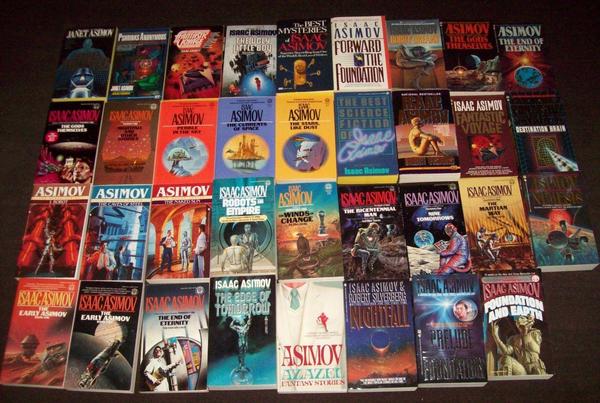
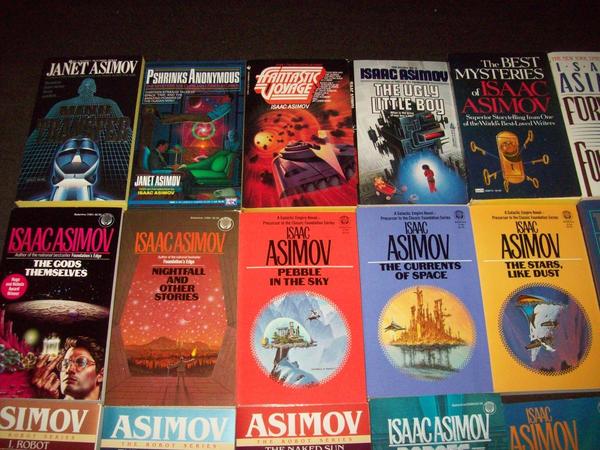
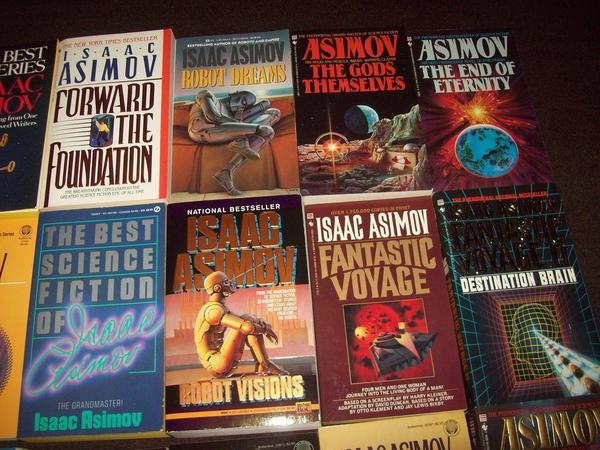
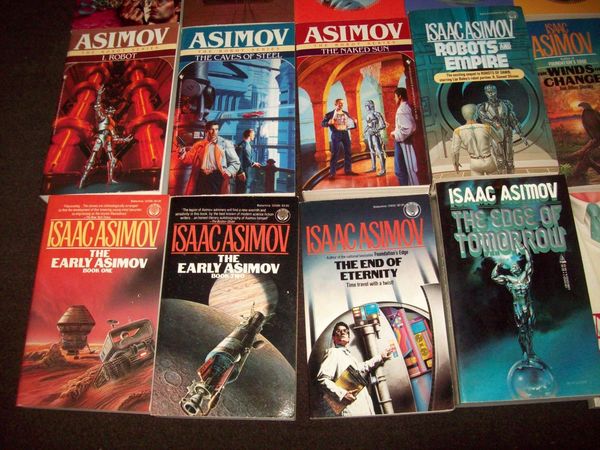
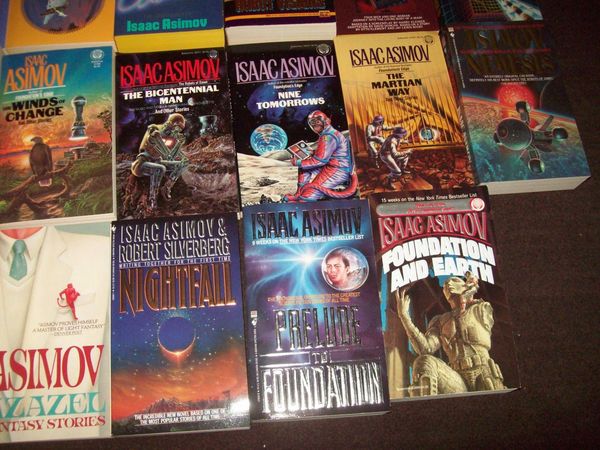
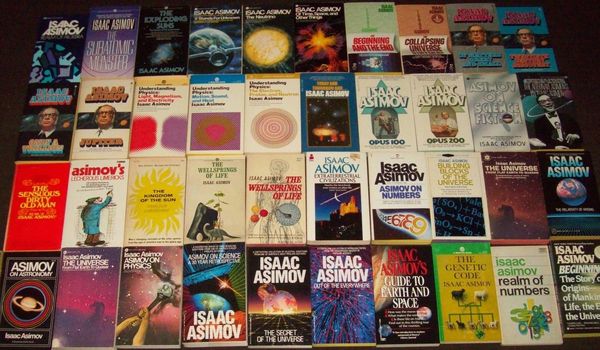
At some point I need to reread the original Foundation trilogy, at least. (I have the Avon paperbacks from the 1970s — the ones with the green, blue & red covers — and they may or may not have come home with me from the SF class I took for English one year in high school.)
My girlfriend in college (20 years ago) recommended the Foundation Trilogy to me. I thought it was ok. Not great. Asimov was never really good with developing believable characters that you cared about. He was more of a big idea man. I loved “Nightfall” and “Bicentennial Man.” I think I read Nightfall in both the short story form and as the extended novella.
I like some of the short work well enough, but for me, the novels are generally pretty flat. As a reader, I tend to be a weak visualizer, so I need someone who’s very good at description – and that ain’t Isaac. You can read some whole books of his and come away with no idea what anyplace looked like.
> At some point I need to reread the original Foundation trilogy, at least.
Joe,
I loved the Foundation trilogy when I first read it as a teenager. I liked it when I re-read it in my twenties. When I tried again in my thirties… I couldn’t figure out why it had no women in it. That wasn’t its only problem, but it was the most glaring. I was never able to finish it again.
I guess you haven’t read Nemesis? The Robots series? Women are the smartest strongest willed characters while men just have force(and lose out). Asimov was always a spokesmen for equality, civil rights, and even called women the wiser sex in many an interview. Just because he did the lewd thing or two, less than the norm of his era, doesn’t mean I’m going to sit idle and such a slight goes unmet with reason.
I have read Nemesis. I thought it the weakest Asimov novel I’ve yet read, and it did nothing to improve my opinion.
> Asimov was never really good with developing believable characters that you cared about.
> He was more of a big idea man.
NOLAbert,
Well, I wouldn’t go that far. You’re absolutely right it wasn’t his strength. But the Bicentennial Man was a pretty compelling character. I think the same of Edith Fellowes in “The Ugly Little Boy.”
Asimov WAS capable of creating truly believable, enduring characters. But it wasn’t where his interests (or his strengths) really lay.
> I like some of the short work well enough, but for me, the novels are generally pretty flat.
Thomas,
Agreed. Some of his short stories have stayed with me since the 70s. I read NEMESIS shortly after it was released in the late 90s, and I haven’t the foggiest recollection of it.
“The Dead Past” is my favorite Asimov story … also one of the great SF stories of all time.
Besides the ones Mark lists — good choices, though I do tend to think “The Bicentennial Man” is a bit overrated — I’d mention “The Martian Way”, and also some more obscure stories — “No Connection” for one example.
John,
I can’t remember if I ever read “The Ugly Little Boy” but I would agree with you that the Bicentennial Man was a compelling character. But in that case the big idea and the character were one. Mark’s description of the “The Ugly Little Boy” above also sounds like the big idea and the character(s) were the same focus. Now, maybe my evaluation of Asimov is colored by my now decades long recollection (it’s probably been about 20 years since I last read Asimov), but that seems to be the conclusion I remember reaching about Asimov all those years ago. I even seem to remember that Asimov wrote an editorial in his magazine where he admitted that he wasn’t the best at developing characters. But maybe I’m misremembering.
Asimov is one of a handful of 20th century sff writers that earned the privilege of having at least a foot of shelf space in just about every book store in the early 21st century here.
His “crude pulp techniques” are maybe embarrassing to some of y’all, but he’s nevertheless quite competitive with new readers.
Foundation by Isaac Asimov, ranked 4,345 in Books
The Martian Chronicles by Ray Bradbury, ranked 6,243 in Books
Starship Troopers by Robert A. Heinlein, ranked 6,689 in Books
Old Man’s War by John Scalzi, ranked 8,560 in Books
Childhood’s End by Arthur C. Clarke, ranked 8,847 in Books
Red Shirts by John Scalzi, ranked 12,073 in Books
Lock-In by John Scalzi, ranked 46,591 in Books
It’s not Seldon’s dead hand that’s caused his popularity to endure to this degree. The guy had it where it counts.
> “The Dead Past” is my favorite Asimov story … also one of the great SF stories of all time.
Rich,
OK, I’ve never even heard of that one. Off to find it!
> Besides the ones Mark lists — good choices, though I do tend to think “The Bicentennial Man” is a bit overrated —
> I’d mention “The Martian Way”
“The Martian Way” was one of the first stories I re-read when I unpacked the box (the other was “I’m in Marsport Without Hilda,” which I found slight but very entertaining), and I was amazed at just how sloooooow it is, especially the open. It’s certainly a truism that pulp SF was fast action, but you could never say that about Asimov.
Perhaps the thrill of a story set in space, and the long build in establishing the premise, kept readers mesmerized for those opening 30 pages in 1952 when the story was first published, and that’s not enough for SF-savvy modern audiences. I don’t know.
> and also some more obscure stories — “No Connection” for one example.
Another one I’ve never heard of! You’re a wealth of obscure Asimov, Mr. Horton. 🙂
> His “crude pulp techniques” are maybe embarrassing to some of y’all, but he’s nevertheless quite competitive with new readers.
Jeffro,
Those are some impressive sales stats. Thanks for sharing. Those are current numbers?
I read The Gods Themselves a few years ago and rather enjoyed it. Again, it’s very much an “idea” novel, but the scientific conundrum is startling and fascinating, and plenty serious enough to base a book on. There are weaknesses – the alien culture that’s so important to the story feels ingenious and well-worked out instead of natural or convincing; it never feels anything other than a “paper” creation. But the human characters and relations are, for once in Asimov, the high point of the book. It seemed as if Asimov was writing about something – professional jealousy and rivalry in an academic setting – that he had some real, personal knowledge of. It made a big difference.
@John
Yes, I just pulled those rankings off of Amazon this morning.
Insert shameless plug for BG post on Asimov’s ‘Caves of Steel.’
https://www.blackgate.com/2015/03/23/the-public-life-of-sherlock-holmes-asimovs-the-caves-of-steel/
I haven’t reread “The Martian Way” in decades (while I think I reread “The Dead Past” about five years ago) so you may be right, and it may not hold up.
I wouldn’t be surprised if I’ve read the complete SF of Asimov, actually, lots of this accomplished by the time I was about 15.
> Insert shameless plug for BG post on Asimov’s ‘Caves of Steel.’
Bob,
Shame on me for not including that link in the article. Thanks for sharing it!
You made a wise investment in some great books! From your photos, it looks like many of these books were never read!
> From your photos, it looks like many of these books were never read!
It sure looks like they were never read to me. It’s a really gorgeous collection.
The same seller also had collections of Arthur C. Clarke and Philip K. Dick… I bought the Clarke collection, but the Dick sold for over $500. 🙂
[…] machines behind them. For instance, Black Gate has recently reported on Isaac Asimov’s crude pulp techniques. But note the old master’s current rankings over at […]
I guess you haven’t read Nemesis? The Robots series? Women are the smartest strongest willed characters while men just have force(and lose out). Asimov was always a spokesmen for equality, civil rights, and even called women the wiser sex in many an interview. Just because he did the lewd thing or two, less than the norm of his era, doesn’t mean I’m going to sit idle and such a slight goes unmet with reason.